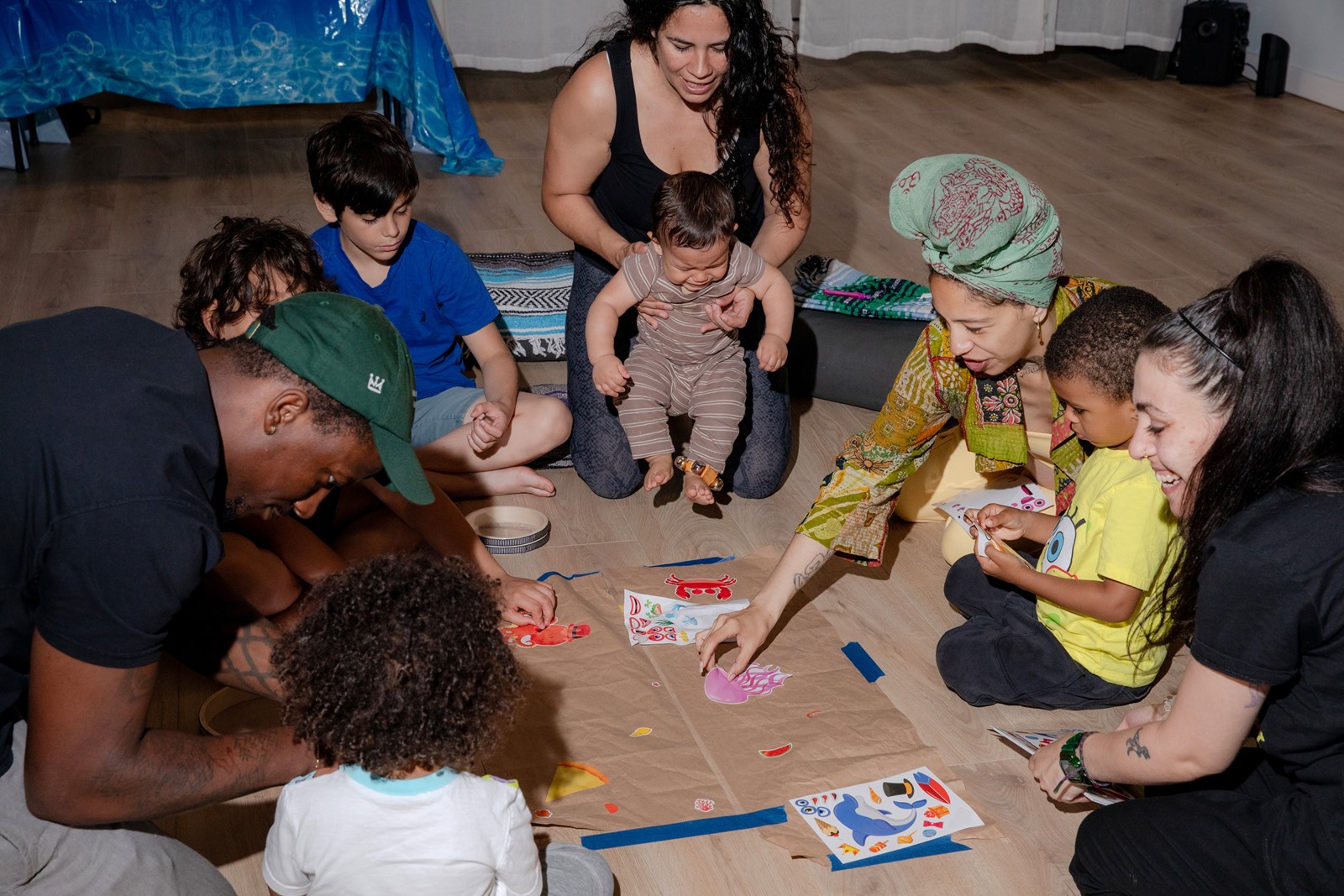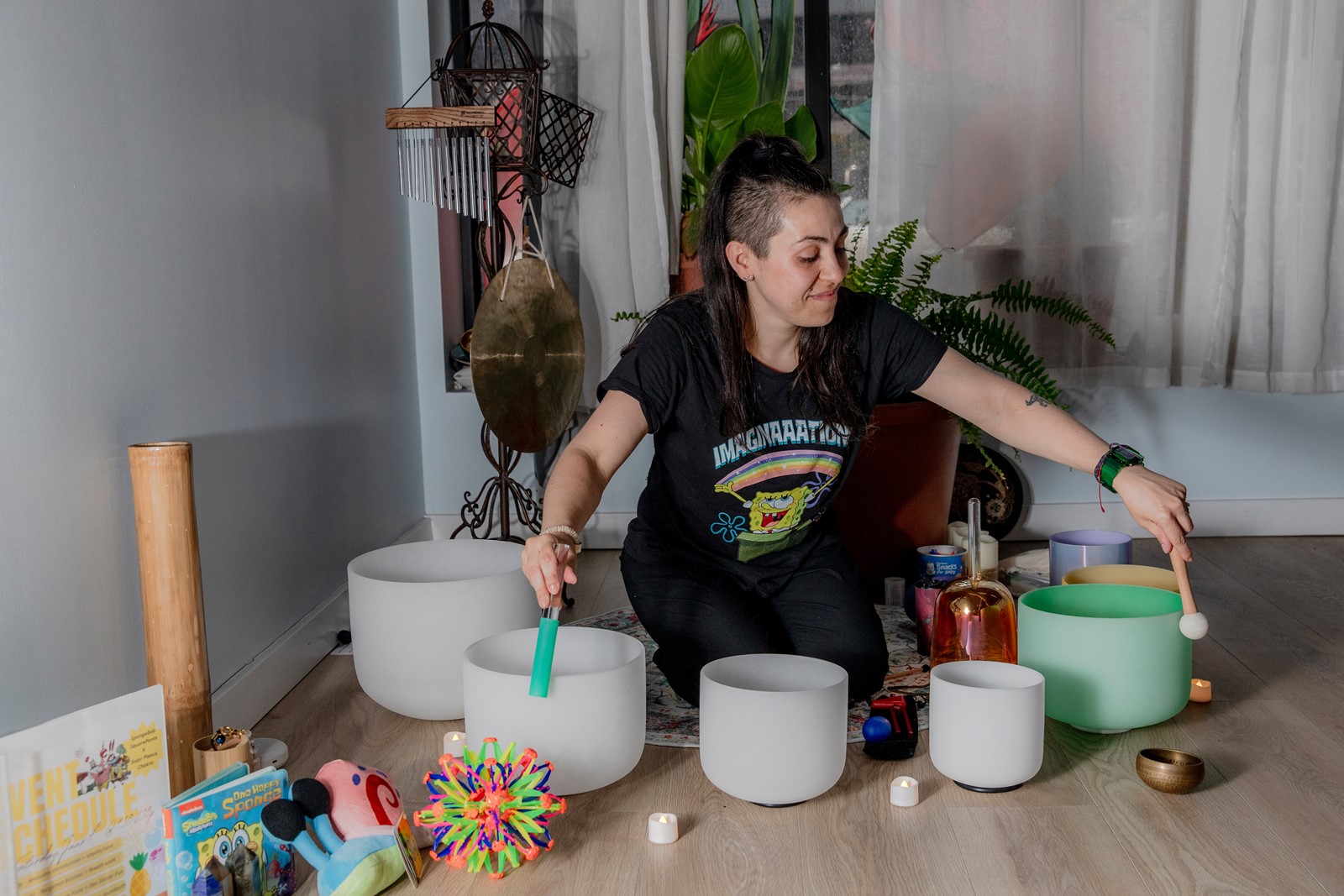

On a recent Saturday morning at Artful Souls & Wellness, a street-level yoga studio in Brooklyn’s Williamsburg neighborhood, a group of 10 gathered in a circle surrounded by cushions, plants, instruments and essential oils. Rain fell outside while calming music played; the mood was serene.
The group had assembled in a space often used for traditional yoga classes, but this time, they were there for a SpongeBob SquarePants solar plexus chakra workshop.
Mandi Finkel-Jimenez, a licensed massage therapist, sound healer and founder of Quintessential Therapy, began by leading the four adults, four children and one baby through what she called “bergamot bubble breathwork,” which involved blowing bergamot-infused bubbles, made by Finkel-Jimenez, while practicing controlled breathing techniques.
Soon, the families would play with stickers, creating their own Krusty Krab “pizzas” before settling into a 25-minute musical sound bath focused on a SpongeBob-themed meditation story. Ten-year-old Gavin sat cross-legged, eyes closed. His 8-year-old brother, Griffin, sat next to him, plucking a small kalimba while their mother, studio director Estrella Muñoz, who said she brought her children to these classes twice a month, held her 8-month-old son, Gaius, in her lap.
Finkel-Jimenez, 35, began offering programming for children in 2021, but in May, she kicked off an eight-class 1990s nostalgia series, starting with a “Magic School Bus”-themed session in May, which combined character Ms. Frizzle’s flair for education and adventure with work on the root chakra.
Such are extracurricular activities in 2025. Where parents once obsessed over SAT prep, math tutors and piano lessons (and still do), their children’s enrichment can now include deep breathing, sound-bath sessions and a general pursuit of calm. Although fees can range from $20 a person for a group meditation workshop to $325 for a three-hour private session with a coach or more, the outcomes, for many parents, are priceless: calmer bedtime routines, fewer grocery store meltdowns, siblings who rationally negotiate rather than pummeling one another.
Sebastian Alappat founded Spark, an art, yoga and mediation program with locations in Manhattan and Kunkletown, Pennsylvania, in 2015. Growing up in Kerala, India, “I felt I had a unique story to tell on how yoga can help kids become more flexible and how breathwork could help them regulate,” he said, adding that he believes he has found a way “to give children a toolbox for life.”
Now, at Spark’s after-school programs and summer camps in both locations, children typically start each session with up to 12 minutes of yoga to “get the sillies out,” move to breathwork and eventually settle into 45-minute art sessions. With each camp, Alappat integrates outdoor plein-air art sessions, inspired by Claude Monet and John Singer Sargent.
Although meditation, yoga and sound-bath classes for adults are ubiquitous in major cities, kid-friendly versions have gained traction only recently, “as more parents recognize the importance of nurturing emotional health and resilience in their children,” Finkel-Jimenez said. “The earlier children begin, the sooner they understand the concepts.”
“Practices like meditation and mindfulness help dial down the emotional and physical intensity we feel during periods of stress, anxiety or difficulty concentrating,” said Becky Lois, director of the KiDS of NYU Foundation Integrated Behavioral Health Program at Hassenfeld Children’s Hospital at NYU Langone.
Even babies stand to gain something, she said: “While infants aren’t meditating themselves, they benefit tremendously when their caregivers are practicing mindfulness,” and such mindfulness can lead to moments that support “early attachment and emotional development.”
“Demand has exploded” for children’s classes over the past decade, especially in the past five years, said Suze Yalof Schwartz, who founded Unplug Meditation studios in Los Angeles in 2014. “With this new anxious generation, we are constantly being recommended by both psychologists and teachers to teach kids privately how to breathe and pause before the temper tantrum.”
Brooke Campanelli, an owner of SoulPlay Yoga & Fitness Studio in Los Angeles who teaches mindfulness across all grades, said she has seen enrollment increase since the COVID-19 pandemic and parents are “desperate for support.”
For some families, the benefits are even more consequential.
In 2020, Marina Glekel, a mother of two who lives in West Bloomfield, Michigan, hired meditation coach Veronica Moya, who splits her time between New York and Florida, to work virtually with her two teenage sons — particularly her youngest, Tony, who has Type 1 diabetes.
Moya “taught him how to relax, listen to his body and lower his stress levels,” Glekel said. The meditation practice also helped him stabilize his blood sugar levels. She continues to work with Moya to schedule one-off sessions for her sons and joins Moya’s live sessions on YouTube.
The benefits make sense to Dr. Meredith Wilkes, medical director of the Pediatric Diabetes Program at Mount Sinai in New York City. “Diabetes-related distress, anxiety and depression all negatively impact blood sugar control,” she said. “Mindfulness, including meditation, has the potential to help children with diabetes and other chronic medical issues reduce disease-related distress.”
The equipment that Michelle Kiernozek, a pediatric occupational therapist in Albany, New York, travels with to different studios for her classes tells a story of its own. Picture souvenirs from a wellness retreat’s gift shop intertwined with a toy aisle at Toys R Us: stuffed animals that demonstrate proper diaphragm technique. Pinwheels become tools for mastering controlled extended exhalation.
This is mindfulness for the generation learning colors from Ms. Rachel and CoComelon and whose parents came of age with social media. Their children are not just seeking enlightenment in silent rooms — they’re also finding it between iPads and juice-box breaks.
As the session winds down at Artful Souls & Wellness, families return their instruments and delve into their Saturday routines. For Muñoz and other parents, the activity represents a new kind of enrichment, with a focus on regulation and mental health — not trophies and performances.


 PREVIOUS ARTICLE
PREVIOUS ARTICLE
